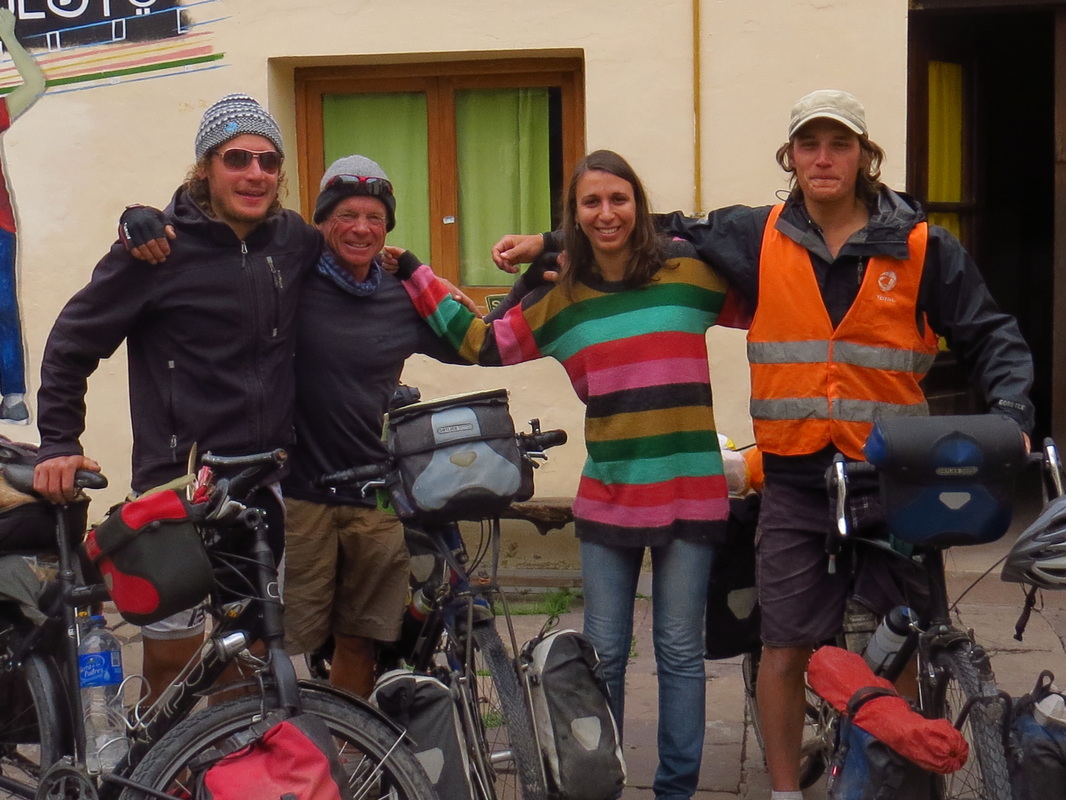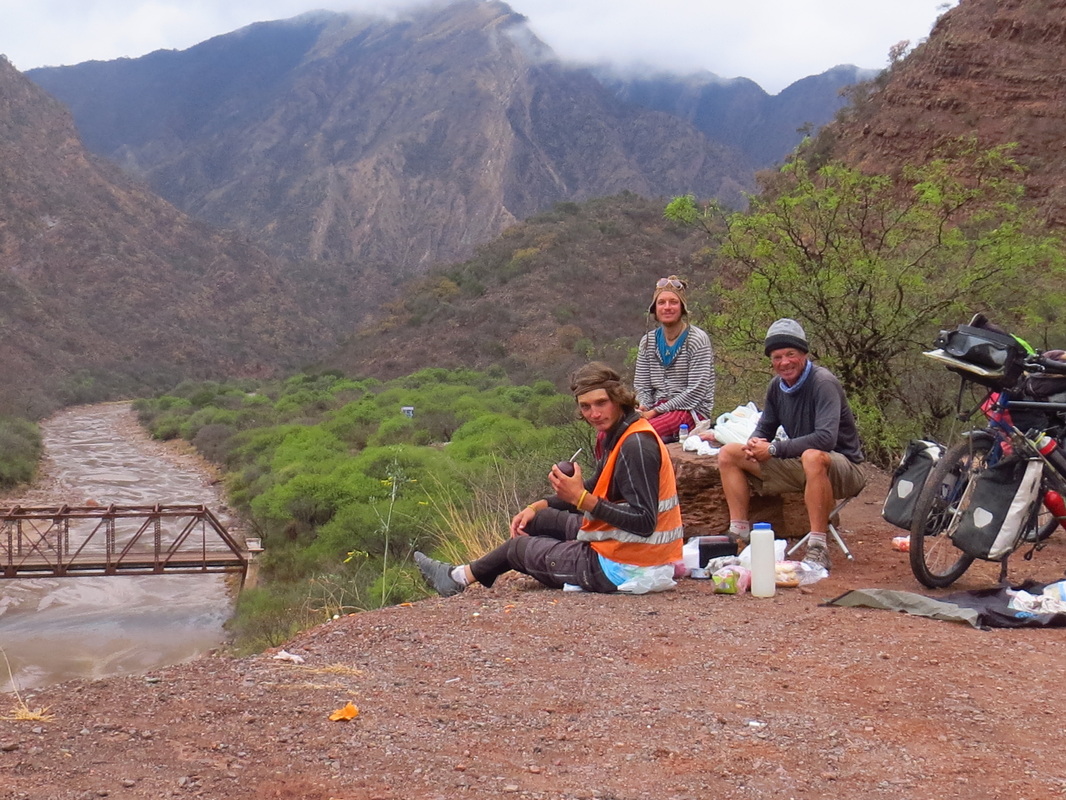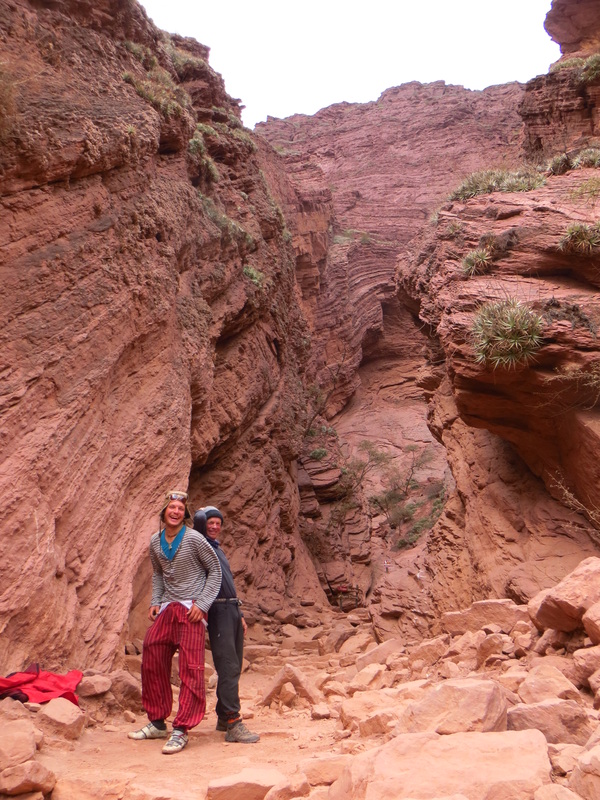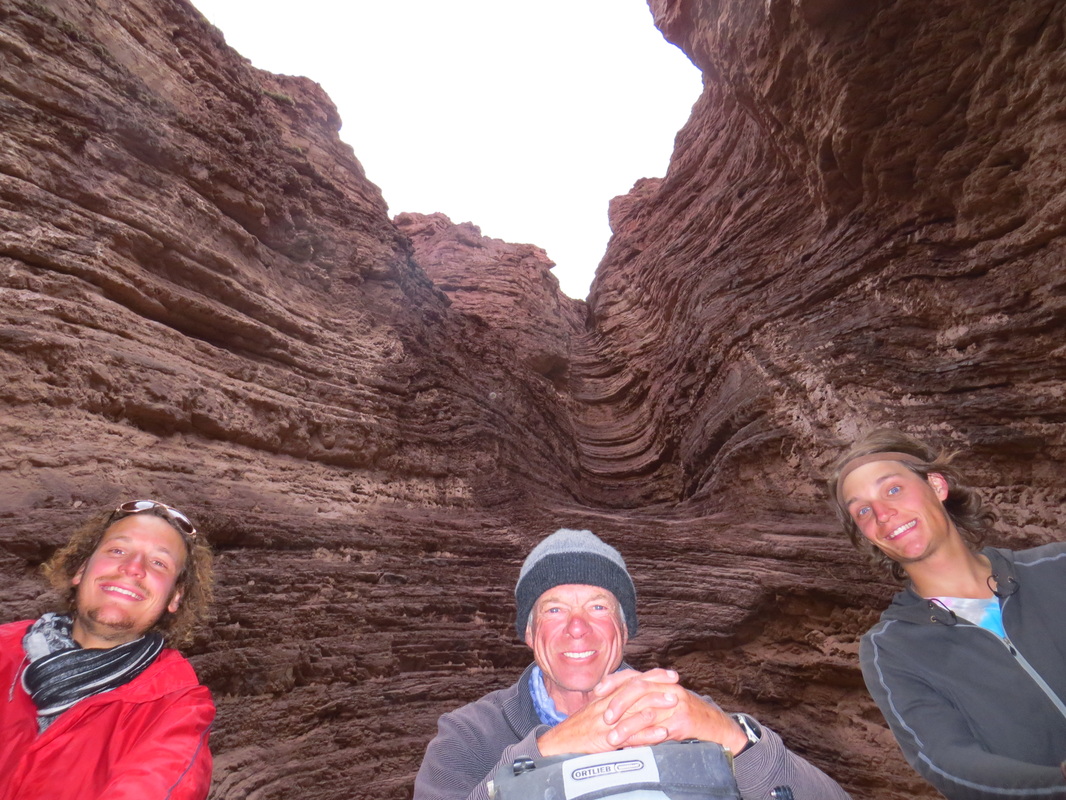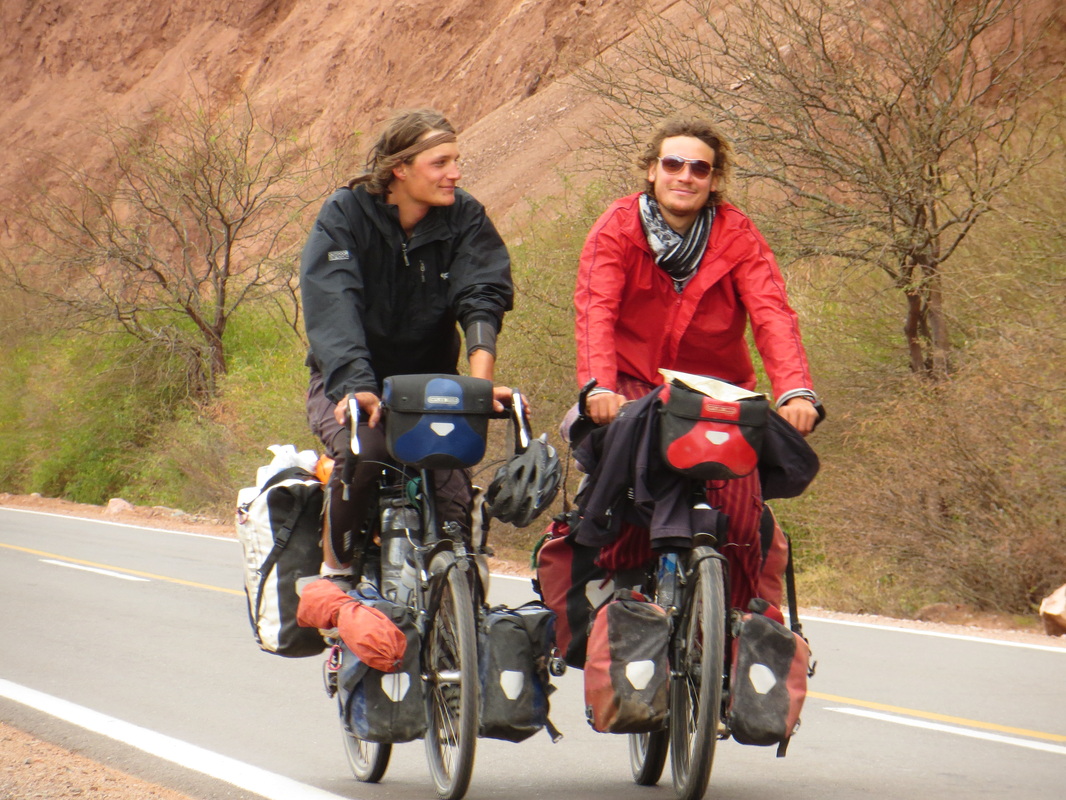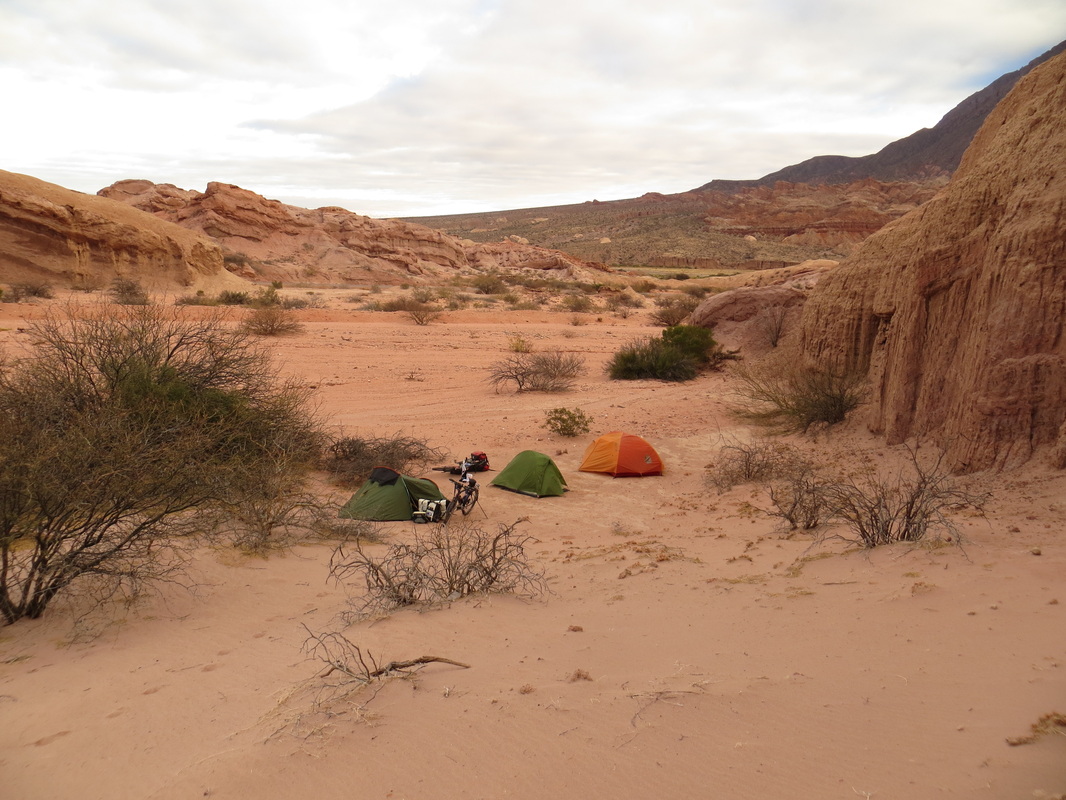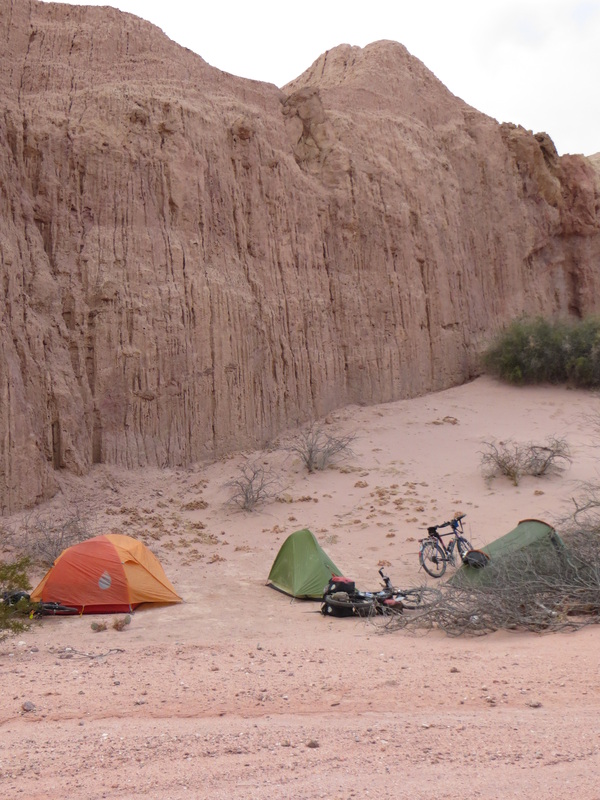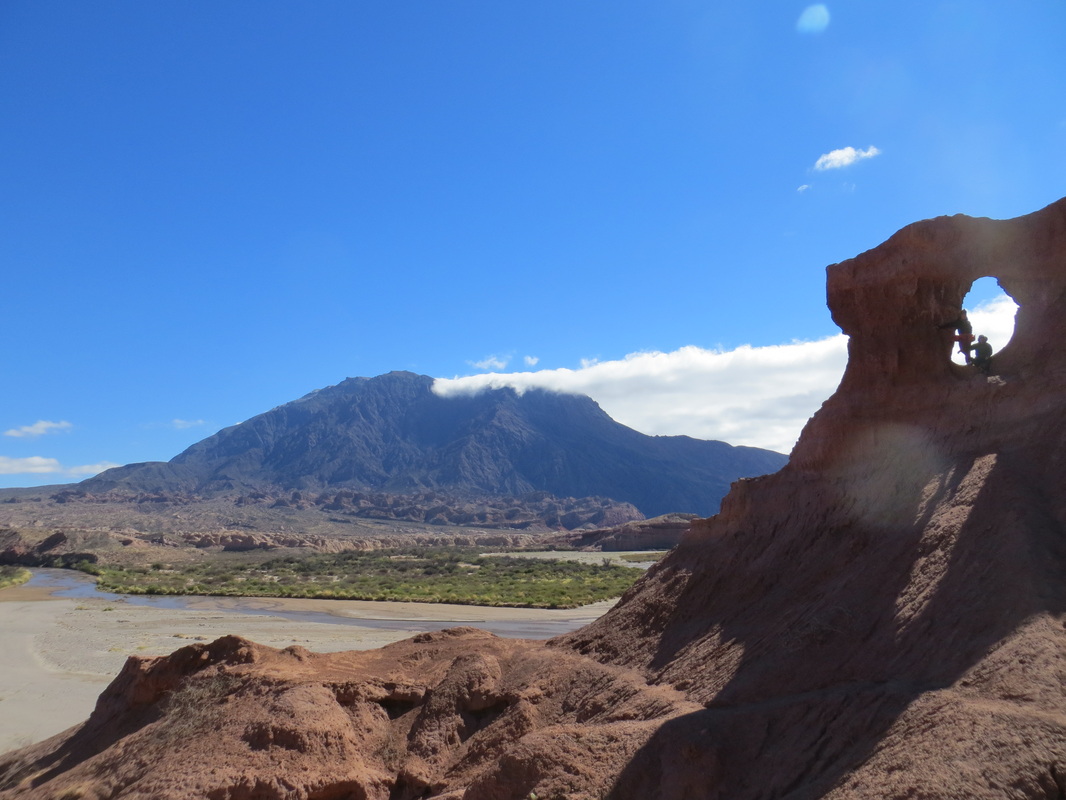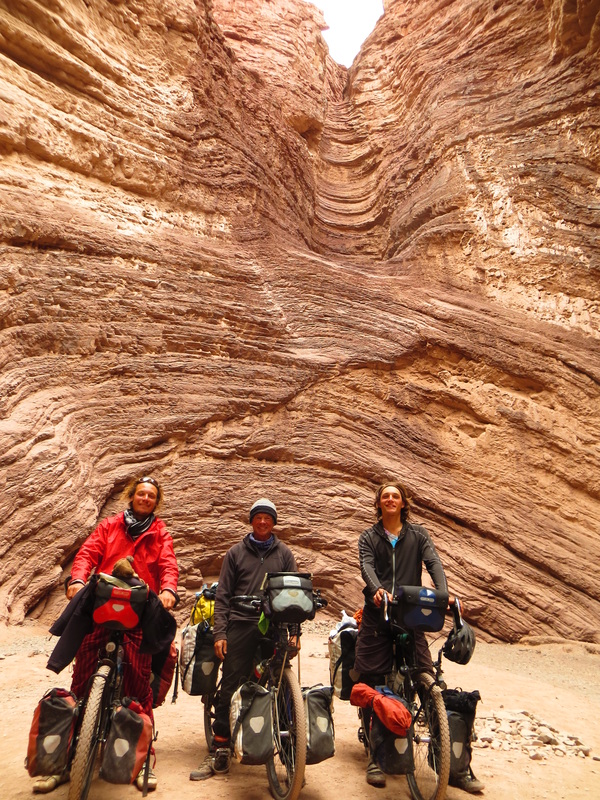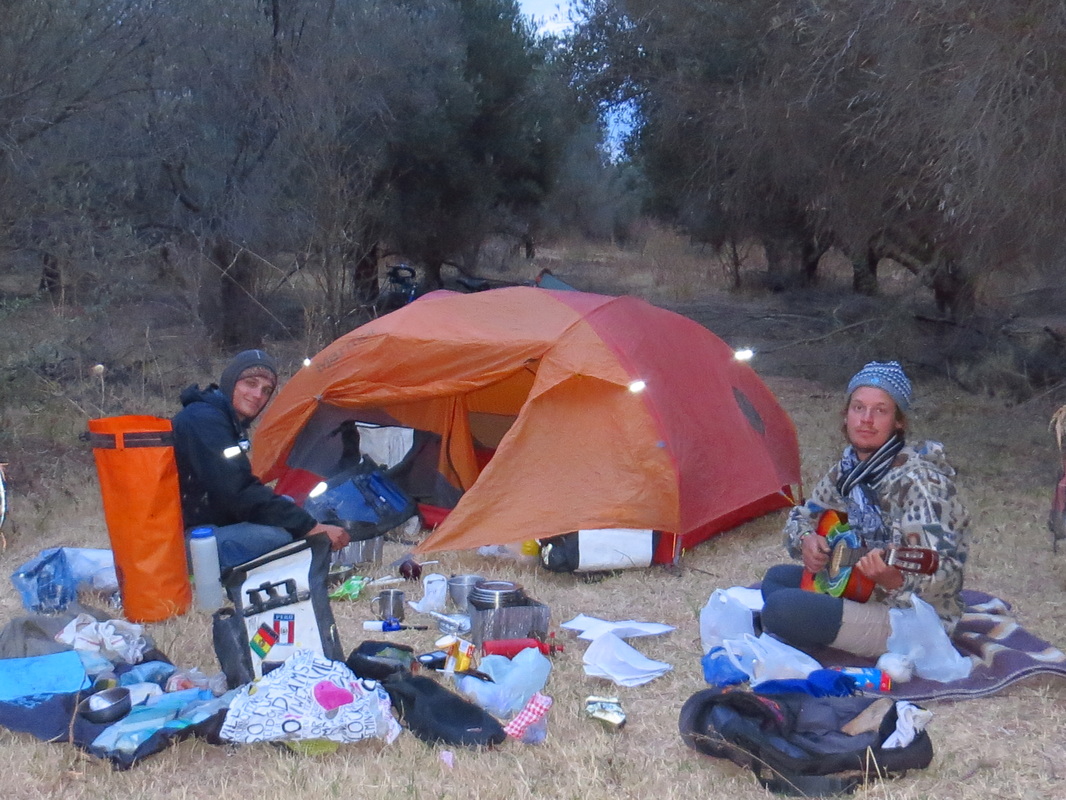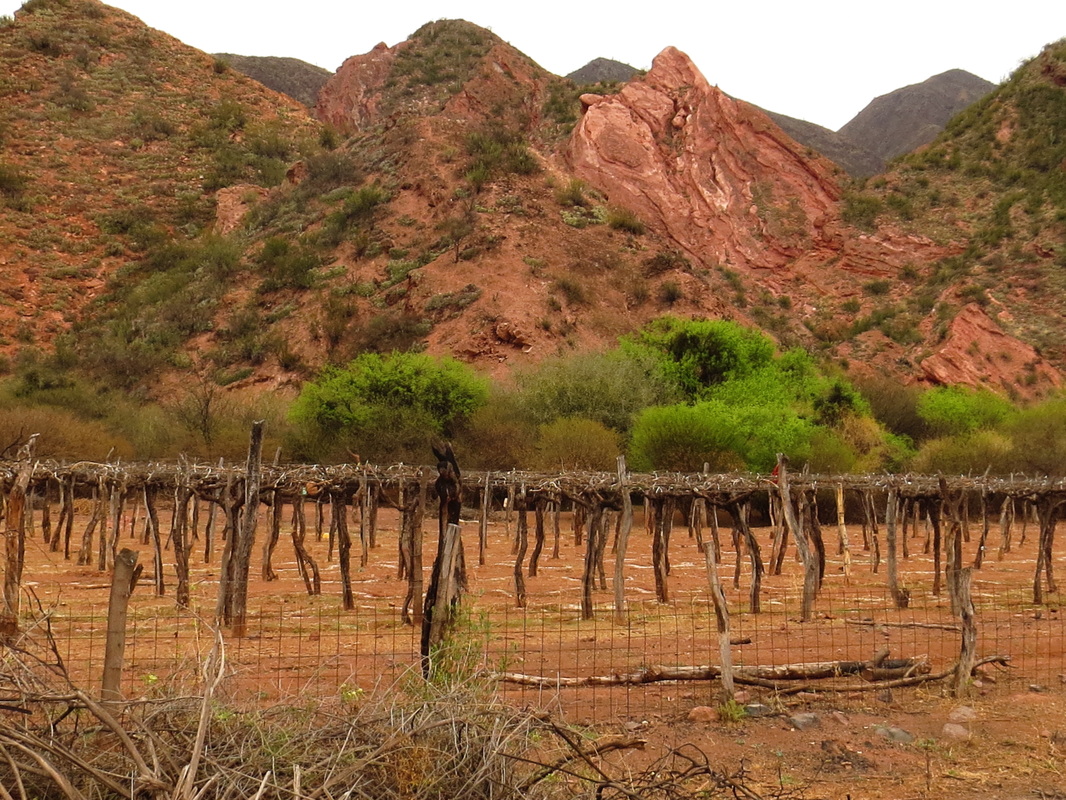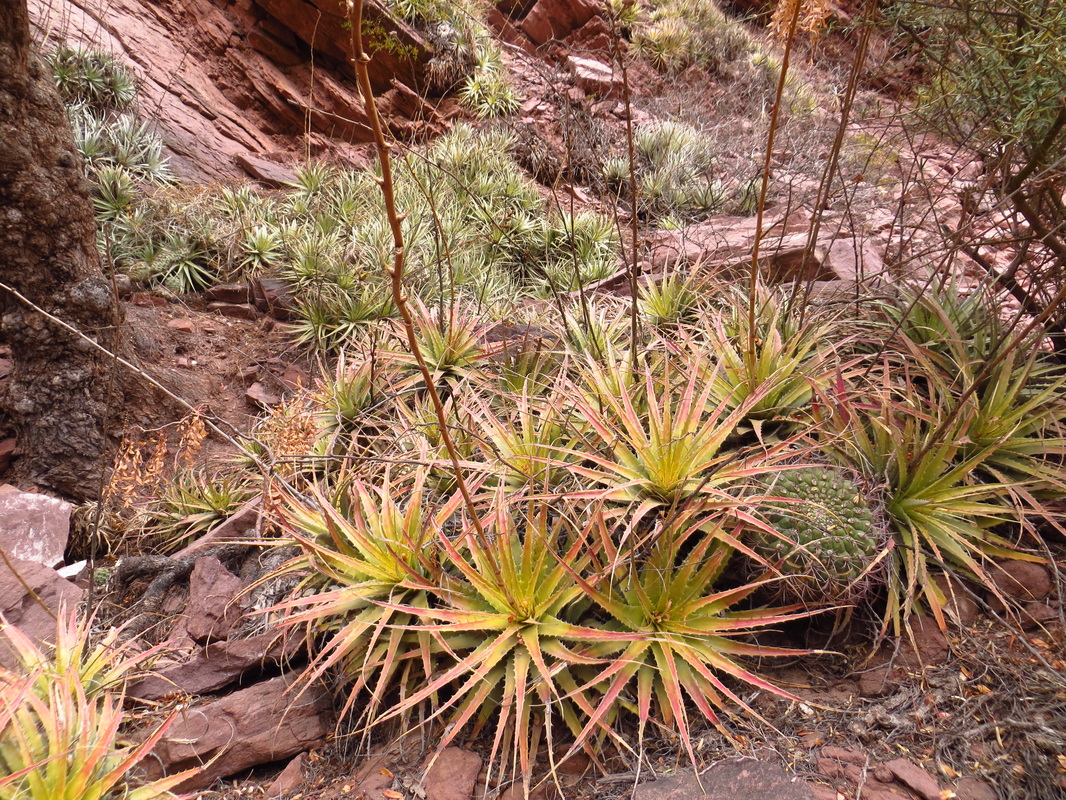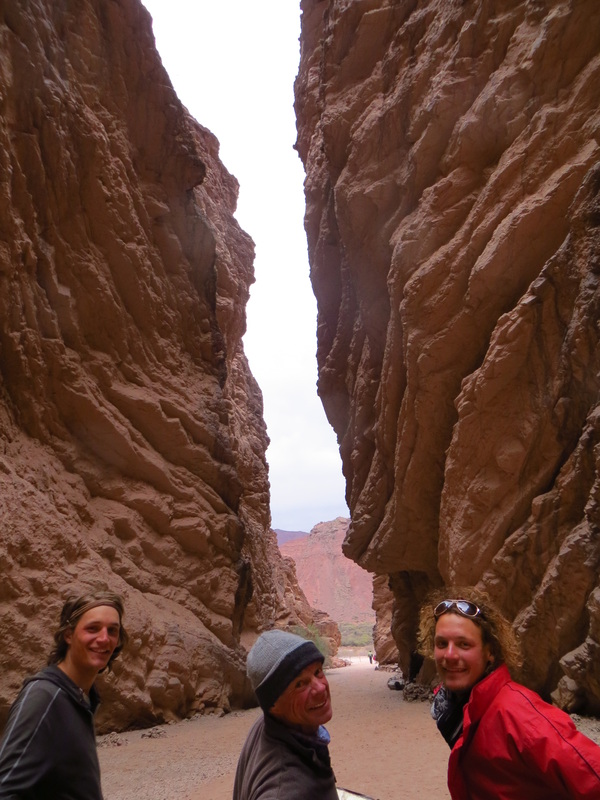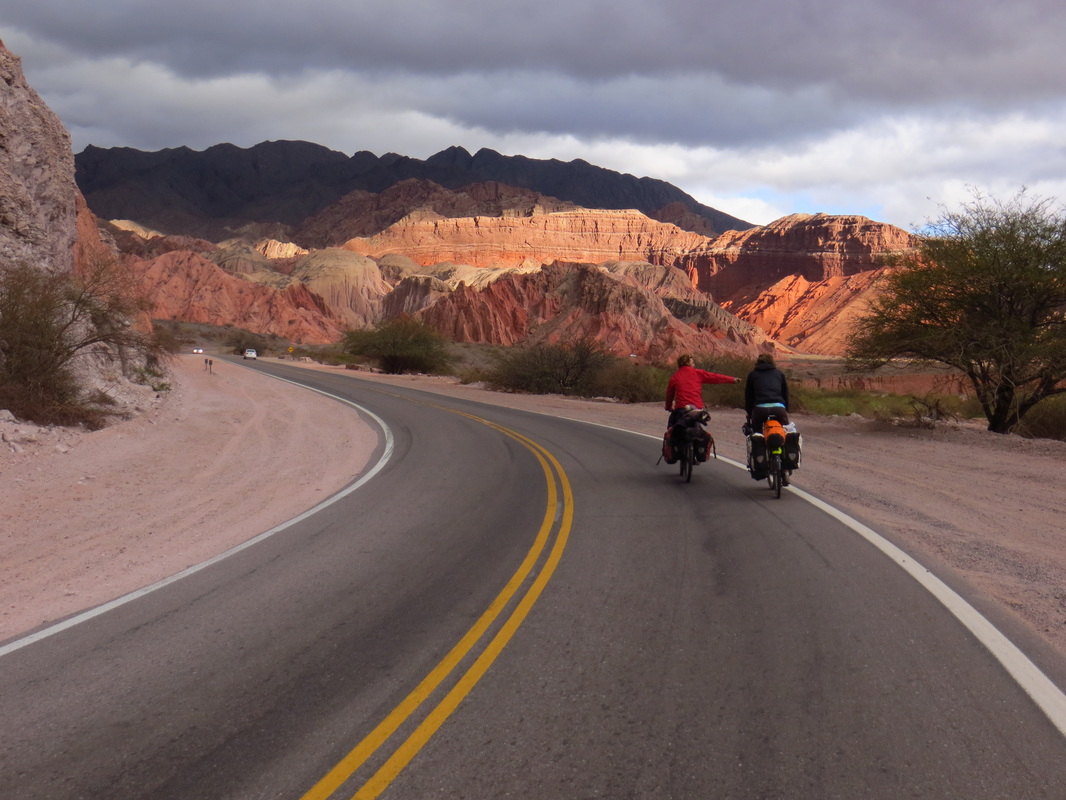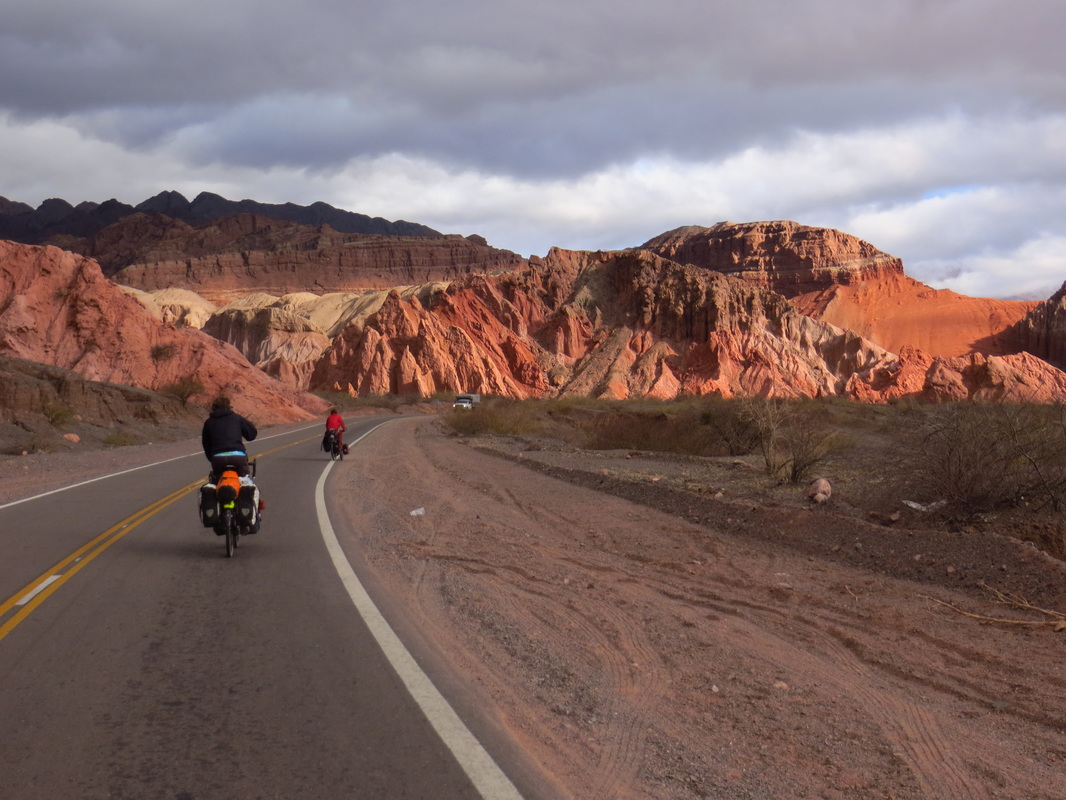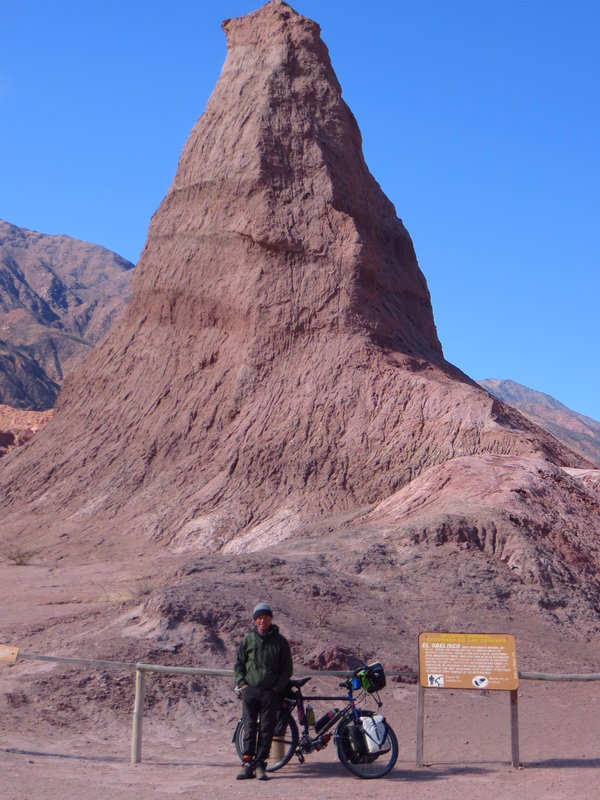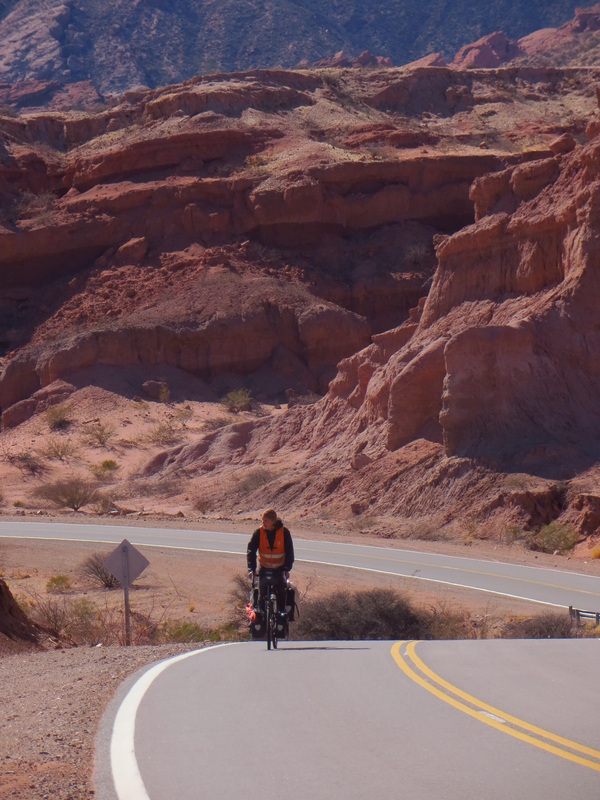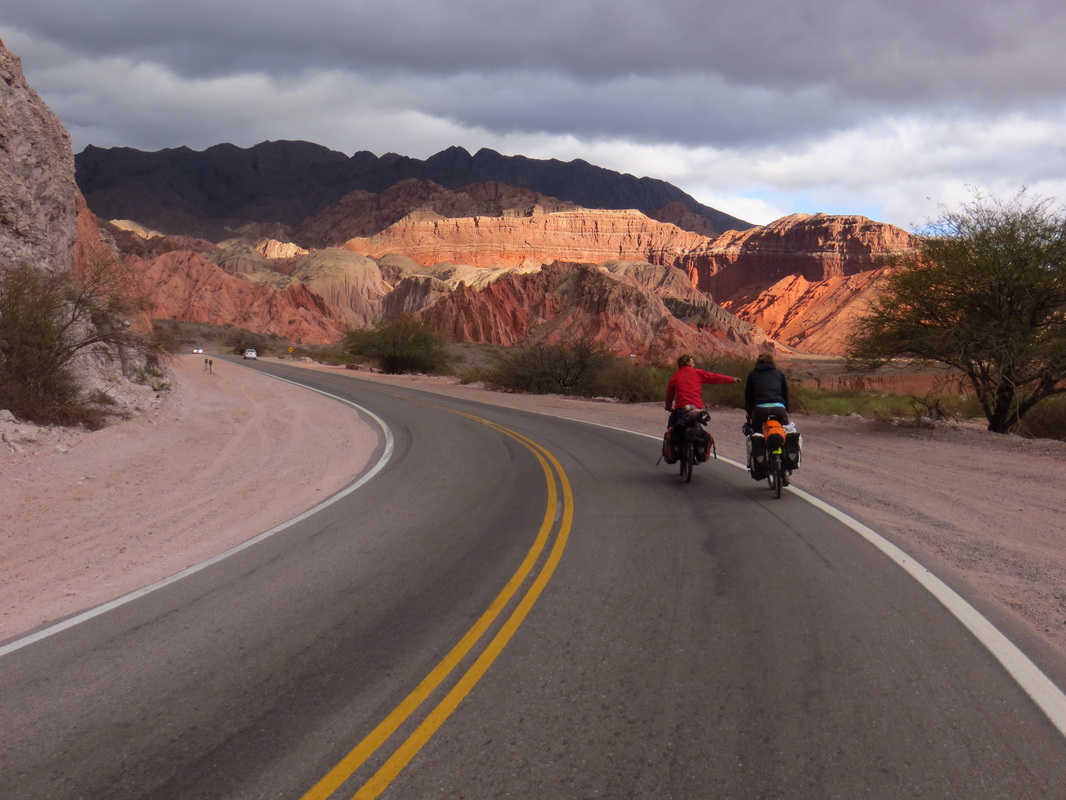15/9/2013 Salta to 13km north of La Viña
D70, T3/4.5, Av21.78, Max60, Tot19110, 9948
Overcast and a bit cool
It was a good couple of days rest here, it was good to spend time with other cylclists. The guys were fun. Loic had decided to go on a day later.
Kurt, Lucas and I finally got away today at about 1130.
It was a bumpy ride out of Salta on cracked concrete pavement.
The road, typical of the few ridden here so far had no shoulder, luckily it was not too busy.
We stopped for lunch on a nice grassy property, not dissimilar to a driving range.
We were making good time.
The guys rode at a steady fast rate which suited me.
Life is pretty easy now, with tiendas at regular intervals and tapped water at most buildings. We loaded up with plenty at a small town. By now it was about 1700. We felt like stopping.
Near Embase Cabra Corral., we found an olive plantation that looked disused, finding the gate I headed in to check it out, all good. It was a sheltered place for the night.
It was a nice change to camp on grass.
Lucas and i had pasta, with tomato puree and carnita, a soy protein granule.
We sat around listening to Lucas play on the guitar and then a bit of music.
We were all tired, it had been a few late nights in Salta.
16/9/2013 North on La Viña to 25km north of Cafayate
D98, TT5/7, Av18, Max63, Tot19208, 10,046
Good tail winds, cool and overcast about 15°C
We all had a great nights sleep.
Lucas headed off into the orchard early to meditate, as he does for an hour a day.
I would love to be disciplined enough to do this. We had our normal breakfasts and got on the road about 1000.
The riding was great, just gently up and back down, with great rural scenery. That of the odd vineyard and other crops. Though the country was generally very dry.
We soon entered the Quebrada de la Conchas. Riding here was a pleasure. The scenery was to behold, with the most amazing barren rock ranges. They were presented to us in all shades of red and brown.
The strata was wavy one minute, then contorted the next. All the while we were following the Valle de Lerma, and a river with little water in its bed.
Lunch was enjoyed overlooking the small pueblito of Alemania.
We were eating well, having bought fresh baguettes, salami, me anyway, and cheese at a tienda in La Viña. Very popular here on bread is dulce de leche, a sort or caramel spread not unlike honey though not as sticky. On the baguettes, to say it is Moorish is an understatement.
It was a great day riding, with us mucking about on the quiet road, Lucas trying to force me into the gravel shoulder, me resisting, and all of us just enjoying the scenery and each others company.
None of us really had a care in the world, it was one of those kind of days, took me back to my youth.
A time when life was carefree, riddled with enthusiasm and wonderment. A time when the future plans were far from your mind.
Soon in the Quebrada de la Conchas, there were all sorts of rock formations and gorges. We stopped at the amphitheatre and another chasm running deep into the range.
The riding was again, a little climb and then back down again.
At about 0500 water and eggs were obtained in Santa Barbara
It was starting to cool off.
The wind was increasing though from behind us. At one point it must have been blowing 60knots, we were pushed along at 20km without pedalling on a flat road, it was funnelling down the valley.
Finally, at about 1645, Kurt found at spot in an open valley. We pushed our bikes across the desert like landscape to the spot.
By now, it was bitterly cold with the wind chill.
Setting up , we ate couscous, carnita and tomato puree with onions.
The wind was still gusting, we were all cold and retreated to our tents about 2100.
D70, T3/4.5, Av21.78, Max60, Tot19110, 9948
Overcast and a bit cool
It was a good couple of days rest here, it was good to spend time with other cylclists. The guys were fun. Loic had decided to go on a day later.
Kurt, Lucas and I finally got away today at about 1130.
It was a bumpy ride out of Salta on cracked concrete pavement.
The road, typical of the few ridden here so far had no shoulder, luckily it was not too busy.
We stopped for lunch on a nice grassy property, not dissimilar to a driving range.
We were making good time.
The guys rode at a steady fast rate which suited me.
Life is pretty easy now, with tiendas at regular intervals and tapped water at most buildings. We loaded up with plenty at a small town. By now it was about 1700. We felt like stopping.
Near Embase Cabra Corral., we found an olive plantation that looked disused, finding the gate I headed in to check it out, all good. It was a sheltered place for the night.
It was a nice change to camp on grass.
Lucas and i had pasta, with tomato puree and carnita, a soy protein granule.
We sat around listening to Lucas play on the guitar and then a bit of music.
We were all tired, it had been a few late nights in Salta.
16/9/2013 North on La Viña to 25km north of Cafayate
D98, TT5/7, Av18, Max63, Tot19208, 10,046
Good tail winds, cool and overcast about 15°C
We all had a great nights sleep.
Lucas headed off into the orchard early to meditate, as he does for an hour a day.
I would love to be disciplined enough to do this. We had our normal breakfasts and got on the road about 1000.
The riding was great, just gently up and back down, with great rural scenery. That of the odd vineyard and other crops. Though the country was generally very dry.
We soon entered the Quebrada de la Conchas. Riding here was a pleasure. The scenery was to behold, with the most amazing barren rock ranges. They were presented to us in all shades of red and brown.
The strata was wavy one minute, then contorted the next. All the while we were following the Valle de Lerma, and a river with little water in its bed.
Lunch was enjoyed overlooking the small pueblito of Alemania.
We were eating well, having bought fresh baguettes, salami, me anyway, and cheese at a tienda in La Viña. Very popular here on bread is dulce de leche, a sort or caramel spread not unlike honey though not as sticky. On the baguettes, to say it is Moorish is an understatement.
It was a great day riding, with us mucking about on the quiet road, Lucas trying to force me into the gravel shoulder, me resisting, and all of us just enjoying the scenery and each others company.
None of us really had a care in the world, it was one of those kind of days, took me back to my youth.
A time when life was carefree, riddled with enthusiasm and wonderment. A time when the future plans were far from your mind.
Soon in the Quebrada de la Conchas, there were all sorts of rock formations and gorges. We stopped at the amphitheatre and another chasm running deep into the range.
The riding was again, a little climb and then back down again.
At about 0500 water and eggs were obtained in Santa Barbara
It was starting to cool off.
The wind was increasing though from behind us. At one point it must have been blowing 60knots, we were pushed along at 20km without pedalling on a flat road, it was funnelling down the valley.
Finally, at about 1645, Kurt found at spot in an open valley. We pushed our bikes across the desert like landscape to the spot.
By now, it was bitterly cold with the wind chill.
Setting up , we ate couscous, carnita and tomato puree with onions.
The wind was still gusting, we were all cold and retreated to our tents about 2100.
|
|
A friend sent me this article, I found it ever so interesting.
Why We Need Nomads
I recently stumbled on a Quora question in which the writer was thinking about quitting his job and selling his possessions to travel the world. He gave a brief description of himself (single, in his 20s, a job but no career), and asked whether he should go for it.
The resounding answer was yes, but not necessarily because it was a respectable lifestyle. Rather, because he was young enough to get away with it. Because he still had time to build a career, a family, and a real life. Because now was the time to get the travel bug out of his system.
I was glad to read the encouragement and travel tips he received, but couldn’t help wonder: what if a 40-something man with three young children also wanted to become a nomad?
A nomad is someone who travels extensively, with no real home to speak of other than the wide-open road. They usually carry all their possessions with them, and earn little to no income.
Truth from a reliable source
Nomadic travel is tolerated if you are young, responsibility-free, and trying to find yourself, but only for a pre-determined amount of time. Why isn’t travel—apart from age and status—worthy of pursuing in itself as a respectable (not just fulfilling) way of life?
The most common question we get from people we meet since hitting the road full-time is: “How long are you traveling for?”
We still aren’t sure how to answer that. “Um… forever?” Shacky says, and then we explain that we live this way. It’s not a vacation. It’s not a year-long project.
People are puzzled by this concept. Our contact with them usually expires before they grasp it, and as we walk away I can almost hear the wheels turning in their heads with a million questions.
Online, people have fewer questions and more opinions. We are called freeloaders or spoiled by people who don’t know us but dislike the concept of full-time travel. Some accuse us of contributing nothing to society, or worse—burdening it.
This isn’t surprising when you consider that although this lifestyle has many benefits, they are often described as personal fulfillments rather than contributions to the real world, giving us the reputation of takers, not givers.
What benefits do nomads bring to society? Do we really need them?
The answer is a resounding yes. As much as we need lawyers, doctors, and construction workers—we need nomads. Here’s why:
Social Benefits
A few weeks ago Jessica Kurti posted the following story on my Facebook wall:
Transported my first hitchhikers today… was AWESOME. Two ‘through hikers’ doing the entire Pacific Crest Trail. Gave them a lift to Sisters, Oregon, where they were going to eat, run errands, and meet a ‘trail angel’ who would give them a lift to the next trailhead. So, I would like to say THANK YOU, to you, Shacky, Honey Bird and Crockett (their trail names). I learned so much about what is possible! Although I love to help people, I rarely would consider picking up hitchhikers (in this country at least as a single female). SO GLAD I DID. And I wish *all of us* continued safe journeys and amazing adventures ahead! #cannotbelievethisismylife #LIVINGTHEDREAM
Much love from Bend, Oregon (started in Florida). Keep on keeping on!
She was thanking me because I had previously written about our experiences picking up hitchhikers, commenting on how unfounded our society’s fear of hitchhiking actually is.
Nomads are more trusting of strangers than your average person, probably because they spend a large portion of their time talking to strangers. They discover that strangers (and people in general) are inherently good, hospitable, and eager to help. As a result, nomads serve as society’s connectors.
Nomads will:
Nomads connect us to each other, re-establish our faith in humanity, and dispel unfounded social stigmas.
Intellectual Benefits
I first learned about Maslow’s hierarchy of needs in a high school Psychology class. As a child of poverty, it was one of my first introductions to the concept that there may be something more to life than living to fulfill our basic needs of food and shelter.
Abraham Maslow developed this theory in his 1943 paper describing the stages of human growth. While other psychologists of his time were studying the mentally ill, Maslow examined the healthiest one percent of a college student population. He named people like Albert Einstein, Eleanor Roosevelt, and Frederick Douglass as examples he studied. Here is the hierarchy:
Source: Wikipedia – https://en.wikipedia.org/wiki/Maslow%27s_hierarchy_of_needs
Our current society over-emphasizes the bottom two levels at the expense of the top three. Once we have met our basic needs of food, shelter, and security, we are pressured to over-develop those benefits: a bigger house, a nicer car, giving our kids everything they could possibly want (not just what they need). To achieve this, we sacrifice the higher levels of friendships, self-esteem, and the freedom to be creative.
Nomads embody the opposite, and as a result they balance society. We embrace the bare minimum when it comes to food, shelter, and security in exchange for the higher opportunities of self-actualization. We have the freedom to immerse ourselves into areas that the rest of society has little time for: volunteering, extensive travel, year-long projects with little to no financial return, and time-consuming works of art.
We learn from the nomad that happiness comes in different shapes, despite society’s insistence that more money equals more freedom. We see nomads working as their own bosses, or exploring their true passions. Watching them gives us the courage to do the same.
Nomads change the way we think and view the world.
Environmental Benefits
Can you brush your teeth with two sips of water? What if all the water you had access to for the day was the amount you could carry on your back? What if all the trash you could make was limited to what you could pack out? What if the only light you had after dark was a headlamp?
As a nomad, I have learned to use less water, less electricity, and produce less garbage. I have grown resourceful enough to fix things when they break instead of throwing them away. Many nomads live this way. It’s not a weekend camping trip; it’s life. More importantly—it’s not that hard.
Nomads can teach us to respect, appreciate, and preserve our resources. They can show us how to live comfortably with less, how to save hundreds on unnecessary products, and how to stop draining our planet.
I have only experienced two city-wide blackouts in my life: one in Toronto, and one in San Diego. Both times, it felt like mass panic in the neighborhood. As a society, we are uncomfortable with the concept of living with less. We tend to imagine extremes: either we live large or live in a cave with nothing. Nomads know there is a sweet middle ground. We can drastically reduce our carbon footprint yet still fit in with civilized society.
Nomads teach us to respect our resources and show us how it is possible to live comfortably with less.
Global Benefits
A few weeks ago I posted this picture on my Facebook wall and it immediately sparked a flurry of comments.
The photo was taken in Healy, Alaska, just outside of Denali National Park, and was fairly consistent with the avocado prices I had seen in other parts of Alaska. When we began our journey from San Diego, avocados were a main staple in my diet. By the time we arrived in Alaska, I had been forced to give them up. I could no longer afford avocados.
The biggest purchaser of avocados that I know is my good friend Patrick Sweeney. This free-spirited California beach boy practically survives on avocados, hot sauce, and beer. He often posts photos of his fruit and vegetable purchases—mounds of fresh produce at obscenely low prices. Sweeney hates the concept that healthy food is too expensive and unavailable to poor people who want to eat well. This argument, according to Pat, is an excuse that perpetuates the obesity epidemic in America.
I agree with him partially, but not entirely. I have learned from our travels just how region-specific eating well actually is. My idea of healthy eating has evolved from primarily raw vegan to whatever the locals eat, and what the region offers. Along the Pacific Northwest, I enjoyed mostly fresh seafood. Now in Alaska, I eat fresh game meat (mostly reindeer) and salmon that was swimming only hours ago. Here, I would go broke as a vegan.
The avocado issue made me reflect on how many times we make wide, sweeping generalizations about the world based on our own tiny regions.
Nomadism infuses the world with people who can relate to different perspectives. We carry the message that there is more than one way to do things and we refute stereotypes wherever we travel.
Every community seeks to bond over common ideas. This is human nature, and it makes life easier. But every once in a while, every region needs a nomad to shake things up in places where everyone thinks the same, earns the same, and votes the same.
We need nomads to reminds us that our rules do not apply to every inch of this planet. We also need nomads to experience our own regional truths, and carry our stories off to places where our habits are considered strange.
Nomads fight stereotypes by collecting and delivering different world views across regional lines.
Physical Benefits
After watching the documentary Craiglist Joe, Shacky and I were answered a Craigslist ad to pick up a brother/sister pair of backpackers hitchhiking their way across the country. Eddie and Charlotte turned out to be amazing company. We took them to the Grand Canyon and picked up some great travel tips just by observing them.
One of the main things I noticed about Eddie and Charlotte was that they walked—a lot. I was used to viewing movement as a form of exercise in the form of a training plan, or something you needed to schedule. But Eddie and Charlotte walked as a way of life. In the months that followed, I would come to redefine movement for myself.
In my pre-nomad days, I would log all my exercise on a site called Dailymile. It tracked my running, walking, hiking, swimming, or movement of any kind. I could record the mileage and at the end of the week, it would give me a grand total and tell me I was awesome.
After we hit the road, logging workouts on Dailymile became more complicated. Without a GPS surgically attached to my wrist, I had no idea how far I had moved that day. I no longer went out to do a workout. I just went out to play.
Instead of running a pre-determined route, we would pull over to the side of the road intrigued by a hill or mountain, and climb it. We spend time on the trail or in a pool, coming home only when we were hungry or out of water. This healthy concept of movement was a welcome change and we seek to share it with others.
Eddie and Charlotte gazing down into the Grand Canyon for the first time.
Nomads help us see exercise and movement as a way of life, not an activity we need to schedule.
Emotional Benefits
Michael Comerford was the second hitchhiker we picked up on the side of the road. He was surviving as a carnival worker, traveling the country to work various gigs. He told me stories that I’ll never forget about how much carnival workers loved making children happy, yet the irony that most of them came from abusive childhoods and were separated from their own children. He told me about the shocking lack of education and illiteracy in the industry, and the hopeless abandonment the workers would face if they tried to leave their carnival families.
Nomads often immerse themselves into the margins of society. We see, hear, and feel those who have no voice, no words, and no education. These experiences tune us into a full spectrum of human emotions that we can then share, speak about, or write about. They come out in our art, in our music, and inject themselves into the hearts of those we come in contact with.
Back in the “real” world, when I had a real job and a real home, it was easy for me to disconnect. Routine set in, and my emotions were dulled. There was nothing new or exciting, and there was nothing to make me angry or annoyed. I had tweaked my world for maximum comfort and slipped into a state of complete moderation.
Now in a world where anything can happen at any time, I have reconnected with the way I feel about the world. From intense joy to tremendous frustration, nomads experience a wide range of human emotions on a daily basis. We are good at feeling things in a society where emotional displays are often unwelcome.
Nomads expose us to a full spectrum of human emotions that feed our sense of humanity.
Psychological Benefits
When I read Jennifer Pharr-Davis’ book Becoming Odyssa: Epic Adventures on the Appalachian Trail, I was a new nomad struggling with the concept of inactivity. Well-trained in the art of office multi-tasking and accustomed to starting each day with a “to do” list longer than my arm, I was now immersed in a world where it could take all day to do one thing. Sometimes that thing was as basic as finding a place to sleep that night.
I was starting to work on my second book, and if I wasn’t pounding away at my keyboard every spare second, I would feel guilty. The guilt puzzled me since I had no deadline, no boss, and I was writing for fun, yet those societal values of ceaseless “productivity” still lingered in my brain.
In Becoming Odyssa, Pharr-Davis wrote about her own transition from constant movement to sitting still. She describes one incident where she was at a friend’s house, just sitting there. Her friend asked if she wanted a magazine? Did she want to watch TV? But Jennifer just wanted to sit there, as she often would in the evenings on the trail, and that concept made others uncomfortable.
These days I do nothing just as often as I do something. And shockingly, it has made me more productive. I have better ideas, and when I work I am faster and more eloquent, because I have had time to organize my thoughts.
The biggest psychological stress plaguing our society is… well, stress. This goes hand in hand with the concept that we need to be doing something every minute of the day, and any minute resting is a minute wasted. Even when we do stop to rest, we are burdened by thoughts of what productive things we should be doing instead.
Rushing, multi-tasking, and stressing out are now things that only exist in my past, and that is something I learned from a nomad. In return, I seek to pass it on to others. It is a message that our society needs to make time to hear.
Taking it slow and drinking in the views on the Alaska Highway
Nomads encourage us to slow down and de-stress.
Survival Benefits
Residing in what is now Lebanon, the Phoenicians enjoyed a rich, civilized culture based on lumber exportation in 300 B.C. They grew to obtain great wealth due to their enormous and beautiful cedar trees, whose infamy is Biblically referred to as “the cedars of Lebanon.” Their land was plentiful, their people were strong, and their soil was rich.
The Phoenicians were self-sufficient and prosperous, but as they started to clear-cut their cedars trees over time, the quality of their soil decreased. It became harder for them to grow food, and their people started to go hungry.
The leaders of the time decided to go to war to expand their borders and rose up against Alexander the Great. Alexander squashed them like bugs and conquered their entire civilization. Historically, nations who could not feed themselves would never survive.
“Food sovereignty” is the term used to describe a nation’s ability to feed itself—a skill we are rapidly losing in our society. Socialized with the idea that if we need something we must buy it, we commit Phoenician sins at an alarming frequency.
We need people who know how to be self-sufficient. Through programs like WWOOF, many full-time nomads are learning to work organic farms in exchange for free room and board. Nomads are also experts at acquiring the things they need without using money. They barter and trade their services, goods, or skills. No matter how industrialized we become, these ancient survival skills are always useful.
Nomads bring us back to our roots of self-sufficiency, trade, and simple survival.
Irrational Benefits
Philosophically, does the constant supply of information steal our ability to imagine or replace our dreams of achieving? After all, if it is being done somewhere by someone, and we can participate virtually, then why bother leaving the house?
This is the question that Ben Saunders attempted to answer in his 2012 TED talk.
Saunders is a polar explorer and the youngest person to ever ski solo to the North Pole. He ponders his purpose of nomadic travel:
“Nothing will come of it,” he wisely admits. “We shall not bring back a single bit of gold or silver, and not a gem, nor any coal or iron. We shall not find a single foot of earth that can be planted with crops to raise food. So it is no use. If you cannot understand that there is something in man which responds to the challenge of this mountain and goes out to meet it, that the struggle is the struggle of life itself upward and forever upward, then you won’t see why we go. What we get from this adventure is just sheer joy, and joy, after all, is the end of life. We don’t live to eat and make money. We eat and make money to be able to enjoy life. That is what life means, and that is what life is for.”
Nomads understand this to be true first-hand. In a society that demands a purpose and a rational explanation for any expenditure of energy, nomads represent travel, movement, and adventure as worthwhile pursuits in themselves. Theirs are the adventures that inspire books and TED talks. This is where original ideas are born and lives are changed. There is no other job or career on earth that operates on this principle: that the destination is senseless but the journey is everything.
The benefits of living vicariously through your local nomad are also abundant. Not all of us need to ski to the North Pole, but some of us have irrational adventures of our own that we’ve muted with society’s expectations. Sometimes it takes a nomad to come along and uncover them. If we pursue those ambitions, our own adventures will inspire others, and so the circle continues.
Nomads feed our inherent sense of curiosity, wonder, and adventure; they give us permission to follow our own senseless dreams.
While nomads are not the only people on earth who benefit society in these ways, they are important, underestimated, and rare contributors. Just as some of us aspire to bring home a steady paycheck and live in comfortable homes (society needs that too), there are also nomadic spirits chained to their cubicles because they are convinced that travel would be selfish.
It is not selfish. Nomadic travel can never be selfish, because for every benefit you receive, you give away everything—your entire heart, your mind, strength, and life—to forever change the people you meet and tenderly touch the places you visit.
“To move, to breathe, to fly, to float,
To gain all while you give,
To roam the roads of lands remote:
To travel is to live.”
- Hans Christian Andersen
Why We Need Nomads
I recently stumbled on a Quora question in which the writer was thinking about quitting his job and selling his possessions to travel the world. He gave a brief description of himself (single, in his 20s, a job but no career), and asked whether he should go for it.
The resounding answer was yes, but not necessarily because it was a respectable lifestyle. Rather, because he was young enough to get away with it. Because he still had time to build a career, a family, and a real life. Because now was the time to get the travel bug out of his system.
I was glad to read the encouragement and travel tips he received, but couldn’t help wonder: what if a 40-something man with three young children also wanted to become a nomad?
A nomad is someone who travels extensively, with no real home to speak of other than the wide-open road. They usually carry all their possessions with them, and earn little to no income.
Truth from a reliable source
Nomadic travel is tolerated if you are young, responsibility-free, and trying to find yourself, but only for a pre-determined amount of time. Why isn’t travel—apart from age and status—worthy of pursuing in itself as a respectable (not just fulfilling) way of life?
The most common question we get from people we meet since hitting the road full-time is: “How long are you traveling for?”
We still aren’t sure how to answer that. “Um… forever?” Shacky says, and then we explain that we live this way. It’s not a vacation. It’s not a year-long project.
People are puzzled by this concept. Our contact with them usually expires before they grasp it, and as we walk away I can almost hear the wheels turning in their heads with a million questions.
Online, people have fewer questions and more opinions. We are called freeloaders or spoiled by people who don’t know us but dislike the concept of full-time travel. Some accuse us of contributing nothing to society, or worse—burdening it.
This isn’t surprising when you consider that although this lifestyle has many benefits, they are often described as personal fulfillments rather than contributions to the real world, giving us the reputation of takers, not givers.
What benefits do nomads bring to society? Do we really need them?
The answer is a resounding yes. As much as we need lawyers, doctors, and construction workers—we need nomads. Here’s why:
Social Benefits
A few weeks ago Jessica Kurti posted the following story on my Facebook wall:
Transported my first hitchhikers today… was AWESOME. Two ‘through hikers’ doing the entire Pacific Crest Trail. Gave them a lift to Sisters, Oregon, where they were going to eat, run errands, and meet a ‘trail angel’ who would give them a lift to the next trailhead. So, I would like to say THANK YOU, to you, Shacky, Honey Bird and Crockett (their trail names). I learned so much about what is possible! Although I love to help people, I rarely would consider picking up hitchhikers (in this country at least as a single female). SO GLAD I DID. And I wish *all of us* continued safe journeys and amazing adventures ahead! #cannotbelievethisismylife #LIVINGTHEDREAM
Much love from Bend, Oregon (started in Florida). Keep on keeping on!
She was thanking me because I had previously written about our experiences picking up hitchhikers, commenting on how unfounded our society’s fear of hitchhiking actually is.
Nomads are more trusting of strangers than your average person, probably because they spend a large portion of their time talking to strangers. They discover that strangers (and people in general) are inherently good, hospitable, and eager to help. As a result, nomads serve as society’s connectors.
Nomads will:
- connect people with similar interests to each other
- connect people with resources to people in need
- connect strangers in close proximity
- connect Facebook friends in real-person contact
Nomads connect us to each other, re-establish our faith in humanity, and dispel unfounded social stigmas.
Intellectual Benefits
I first learned about Maslow’s hierarchy of needs in a high school Psychology class. As a child of poverty, it was one of my first introductions to the concept that there may be something more to life than living to fulfill our basic needs of food and shelter.
Abraham Maslow developed this theory in his 1943 paper describing the stages of human growth. While other psychologists of his time were studying the mentally ill, Maslow examined the healthiest one percent of a college student population. He named people like Albert Einstein, Eleanor Roosevelt, and Frederick Douglass as examples he studied. Here is the hierarchy:
Source: Wikipedia – https://en.wikipedia.org/wiki/Maslow%27s_hierarchy_of_needs
Our current society over-emphasizes the bottom two levels at the expense of the top three. Once we have met our basic needs of food, shelter, and security, we are pressured to over-develop those benefits: a bigger house, a nicer car, giving our kids everything they could possibly want (not just what they need). To achieve this, we sacrifice the higher levels of friendships, self-esteem, and the freedom to be creative.
Nomads embody the opposite, and as a result they balance society. We embrace the bare minimum when it comes to food, shelter, and security in exchange for the higher opportunities of self-actualization. We have the freedom to immerse ourselves into areas that the rest of society has little time for: volunteering, extensive travel, year-long projects with little to no financial return, and time-consuming works of art.
We learn from the nomad that happiness comes in different shapes, despite society’s insistence that more money equals more freedom. We see nomads working as their own bosses, or exploring their true passions. Watching them gives us the courage to do the same.
Nomads change the way we think and view the world.
Environmental Benefits
Can you brush your teeth with two sips of water? What if all the water you had access to for the day was the amount you could carry on your back? What if all the trash you could make was limited to what you could pack out? What if the only light you had after dark was a headlamp?
As a nomad, I have learned to use less water, less electricity, and produce less garbage. I have grown resourceful enough to fix things when they break instead of throwing them away. Many nomads live this way. It’s not a weekend camping trip; it’s life. More importantly—it’s not that hard.
Nomads can teach us to respect, appreciate, and preserve our resources. They can show us how to live comfortably with less, how to save hundreds on unnecessary products, and how to stop draining our planet.
I have only experienced two city-wide blackouts in my life: one in Toronto, and one in San Diego. Both times, it felt like mass panic in the neighborhood. As a society, we are uncomfortable with the concept of living with less. We tend to imagine extremes: either we live large or live in a cave with nothing. Nomads know there is a sweet middle ground. We can drastically reduce our carbon footprint yet still fit in with civilized society.
Nomads teach us to respect our resources and show us how it is possible to live comfortably with less.
Global Benefits
A few weeks ago I posted this picture on my Facebook wall and it immediately sparked a flurry of comments.
The photo was taken in Healy, Alaska, just outside of Denali National Park, and was fairly consistent with the avocado prices I had seen in other parts of Alaska. When we began our journey from San Diego, avocados were a main staple in my diet. By the time we arrived in Alaska, I had been forced to give them up. I could no longer afford avocados.
The biggest purchaser of avocados that I know is my good friend Patrick Sweeney. This free-spirited California beach boy practically survives on avocados, hot sauce, and beer. He often posts photos of his fruit and vegetable purchases—mounds of fresh produce at obscenely low prices. Sweeney hates the concept that healthy food is too expensive and unavailable to poor people who want to eat well. This argument, according to Pat, is an excuse that perpetuates the obesity epidemic in America.
I agree with him partially, but not entirely. I have learned from our travels just how region-specific eating well actually is. My idea of healthy eating has evolved from primarily raw vegan to whatever the locals eat, and what the region offers. Along the Pacific Northwest, I enjoyed mostly fresh seafood. Now in Alaska, I eat fresh game meat (mostly reindeer) and salmon that was swimming only hours ago. Here, I would go broke as a vegan.
The avocado issue made me reflect on how many times we make wide, sweeping generalizations about the world based on our own tiny regions.
Nomadism infuses the world with people who can relate to different perspectives. We carry the message that there is more than one way to do things and we refute stereotypes wherever we travel.
Every community seeks to bond over common ideas. This is human nature, and it makes life easier. But every once in a while, every region needs a nomad to shake things up in places where everyone thinks the same, earns the same, and votes the same.
We need nomads to reminds us that our rules do not apply to every inch of this planet. We also need nomads to experience our own regional truths, and carry our stories off to places where our habits are considered strange.
Nomads fight stereotypes by collecting and delivering different world views across regional lines.
Physical Benefits
After watching the documentary Craiglist Joe, Shacky and I were answered a Craigslist ad to pick up a brother/sister pair of backpackers hitchhiking their way across the country. Eddie and Charlotte turned out to be amazing company. We took them to the Grand Canyon and picked up some great travel tips just by observing them.
One of the main things I noticed about Eddie and Charlotte was that they walked—a lot. I was used to viewing movement as a form of exercise in the form of a training plan, or something you needed to schedule. But Eddie and Charlotte walked as a way of life. In the months that followed, I would come to redefine movement for myself.
In my pre-nomad days, I would log all my exercise on a site called Dailymile. It tracked my running, walking, hiking, swimming, or movement of any kind. I could record the mileage and at the end of the week, it would give me a grand total and tell me I was awesome.
After we hit the road, logging workouts on Dailymile became more complicated. Without a GPS surgically attached to my wrist, I had no idea how far I had moved that day. I no longer went out to do a workout. I just went out to play.
Instead of running a pre-determined route, we would pull over to the side of the road intrigued by a hill or mountain, and climb it. We spend time on the trail or in a pool, coming home only when we were hungry or out of water. This healthy concept of movement was a welcome change and we seek to share it with others.
Eddie and Charlotte gazing down into the Grand Canyon for the first time.
Nomads help us see exercise and movement as a way of life, not an activity we need to schedule.
Emotional Benefits
Michael Comerford was the second hitchhiker we picked up on the side of the road. He was surviving as a carnival worker, traveling the country to work various gigs. He told me stories that I’ll never forget about how much carnival workers loved making children happy, yet the irony that most of them came from abusive childhoods and were separated from their own children. He told me about the shocking lack of education and illiteracy in the industry, and the hopeless abandonment the workers would face if they tried to leave their carnival families.
Nomads often immerse themselves into the margins of society. We see, hear, and feel those who have no voice, no words, and no education. These experiences tune us into a full spectrum of human emotions that we can then share, speak about, or write about. They come out in our art, in our music, and inject themselves into the hearts of those we come in contact with.
Back in the “real” world, when I had a real job and a real home, it was easy for me to disconnect. Routine set in, and my emotions were dulled. There was nothing new or exciting, and there was nothing to make me angry or annoyed. I had tweaked my world for maximum comfort and slipped into a state of complete moderation.
Now in a world where anything can happen at any time, I have reconnected with the way I feel about the world. From intense joy to tremendous frustration, nomads experience a wide range of human emotions on a daily basis. We are good at feeling things in a society where emotional displays are often unwelcome.
Nomads expose us to a full spectrum of human emotions that feed our sense of humanity.
Psychological Benefits
When I read Jennifer Pharr-Davis’ book Becoming Odyssa: Epic Adventures on the Appalachian Trail, I was a new nomad struggling with the concept of inactivity. Well-trained in the art of office multi-tasking and accustomed to starting each day with a “to do” list longer than my arm, I was now immersed in a world where it could take all day to do one thing. Sometimes that thing was as basic as finding a place to sleep that night.
I was starting to work on my second book, and if I wasn’t pounding away at my keyboard every spare second, I would feel guilty. The guilt puzzled me since I had no deadline, no boss, and I was writing for fun, yet those societal values of ceaseless “productivity” still lingered in my brain.
In Becoming Odyssa, Pharr-Davis wrote about her own transition from constant movement to sitting still. She describes one incident where she was at a friend’s house, just sitting there. Her friend asked if she wanted a magazine? Did she want to watch TV? But Jennifer just wanted to sit there, as she often would in the evenings on the trail, and that concept made others uncomfortable.
These days I do nothing just as often as I do something. And shockingly, it has made me more productive. I have better ideas, and when I work I am faster and more eloquent, because I have had time to organize my thoughts.
The biggest psychological stress plaguing our society is… well, stress. This goes hand in hand with the concept that we need to be doing something every minute of the day, and any minute resting is a minute wasted. Even when we do stop to rest, we are burdened by thoughts of what productive things we should be doing instead.
Rushing, multi-tasking, and stressing out are now things that only exist in my past, and that is something I learned from a nomad. In return, I seek to pass it on to others. It is a message that our society needs to make time to hear.
Taking it slow and drinking in the views on the Alaska Highway
Nomads encourage us to slow down and de-stress.
Survival Benefits
Residing in what is now Lebanon, the Phoenicians enjoyed a rich, civilized culture based on lumber exportation in 300 B.C. They grew to obtain great wealth due to their enormous and beautiful cedar trees, whose infamy is Biblically referred to as “the cedars of Lebanon.” Their land was plentiful, their people were strong, and their soil was rich.
The Phoenicians were self-sufficient and prosperous, but as they started to clear-cut their cedars trees over time, the quality of their soil decreased. It became harder for them to grow food, and their people started to go hungry.
The leaders of the time decided to go to war to expand their borders and rose up against Alexander the Great. Alexander squashed them like bugs and conquered their entire civilization. Historically, nations who could not feed themselves would never survive.
“Food sovereignty” is the term used to describe a nation’s ability to feed itself—a skill we are rapidly losing in our society. Socialized with the idea that if we need something we must buy it, we commit Phoenician sins at an alarming frequency.
We need people who know how to be self-sufficient. Through programs like WWOOF, many full-time nomads are learning to work organic farms in exchange for free room and board. Nomads are also experts at acquiring the things they need without using money. They barter and trade their services, goods, or skills. No matter how industrialized we become, these ancient survival skills are always useful.
Nomads bring us back to our roots of self-sufficiency, trade, and simple survival.
Irrational Benefits
Philosophically, does the constant supply of information steal our ability to imagine or replace our dreams of achieving? After all, if it is being done somewhere by someone, and we can participate virtually, then why bother leaving the house?
This is the question that Ben Saunders attempted to answer in his 2012 TED talk.
Saunders is a polar explorer and the youngest person to ever ski solo to the North Pole. He ponders his purpose of nomadic travel:
“Nothing will come of it,” he wisely admits. “We shall not bring back a single bit of gold or silver, and not a gem, nor any coal or iron. We shall not find a single foot of earth that can be planted with crops to raise food. So it is no use. If you cannot understand that there is something in man which responds to the challenge of this mountain and goes out to meet it, that the struggle is the struggle of life itself upward and forever upward, then you won’t see why we go. What we get from this adventure is just sheer joy, and joy, after all, is the end of life. We don’t live to eat and make money. We eat and make money to be able to enjoy life. That is what life means, and that is what life is for.”
Nomads understand this to be true first-hand. In a society that demands a purpose and a rational explanation for any expenditure of energy, nomads represent travel, movement, and adventure as worthwhile pursuits in themselves. Theirs are the adventures that inspire books and TED talks. This is where original ideas are born and lives are changed. There is no other job or career on earth that operates on this principle: that the destination is senseless but the journey is everything.
The benefits of living vicariously through your local nomad are also abundant. Not all of us need to ski to the North Pole, but some of us have irrational adventures of our own that we’ve muted with society’s expectations. Sometimes it takes a nomad to come along and uncover them. If we pursue those ambitions, our own adventures will inspire others, and so the circle continues.
Nomads feed our inherent sense of curiosity, wonder, and adventure; they give us permission to follow our own senseless dreams.
While nomads are not the only people on earth who benefit society in these ways, they are important, underestimated, and rare contributors. Just as some of us aspire to bring home a steady paycheck and live in comfortable homes (society needs that too), there are also nomadic spirits chained to their cubicles because they are convinced that travel would be selfish.
It is not selfish. Nomadic travel can never be selfish, because for every benefit you receive, you give away everything—your entire heart, your mind, strength, and life—to forever change the people you meet and tenderly touch the places you visit.
“To move, to breathe, to fly, to float,
To gain all while you give,
To roam the roads of lands remote:
To travel is to live.”
- Hans Christian Andersen
